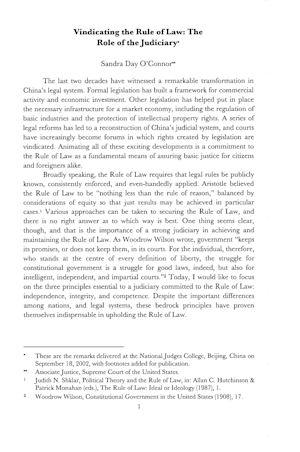By Justice Sandra Day O'Connor
Vindicating the Rule of Law: The Role of the Judiciary
September 18, 2002

Transcript
(Excerpt)
The last two decades have witnessed a remarkable transformation in China's legal system. Formal legislation has built a framework for commercial activity and economic investment. Other legislation has helped put in place the necessary infrastructure for a market economy, including the regulation of basic industries and the protection of intellectual property rights. A series of legal reforms has led to a reconstruction of China's judicial system, and courts have increasingly become forums in which rights created by legislation are vindicated. Animating all of these exciting developments is a commitment to the Rule of Law as a fundamental means of assuring basic justice for citizens and foreigners alike.
Broadly speaking, the Rule of Law requires that legal rules be publicly known, consistently enforced, and even-handedly applied. Aristotle believed the Rule of Law to be "nothing less than the rule of reason," balanced by considerations of equity so that just results may be achieved in particular cases.• Various approaches can be taken to securing the Rule of Law, and there is no right answer as to which way is best. One thing seems clear, though, and that is the importance of a strong judiciary in achieving and maintaining the Rule of Law. As Woodrow Wilson wrote, government "keeps its promises, or does not keep them, in its courts. For the individual, therefore, who stands at the centre of every definition of liberty, the struggle for constitutional government is a struggle
